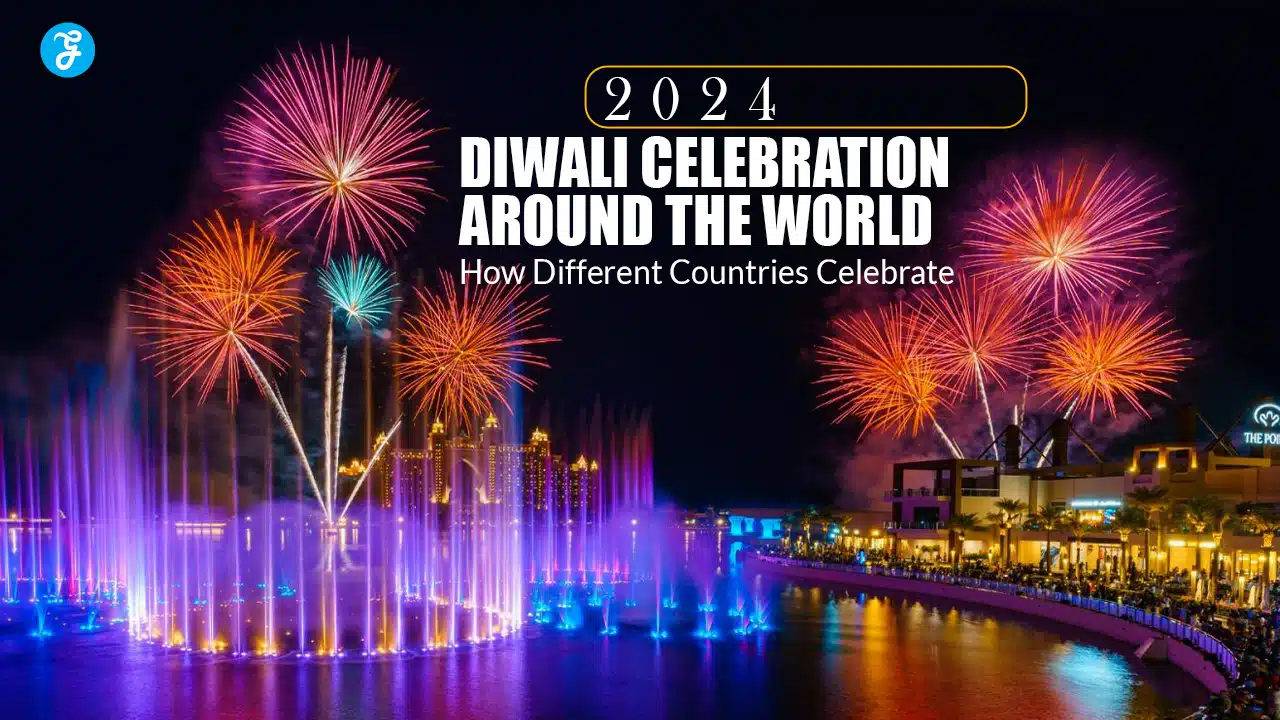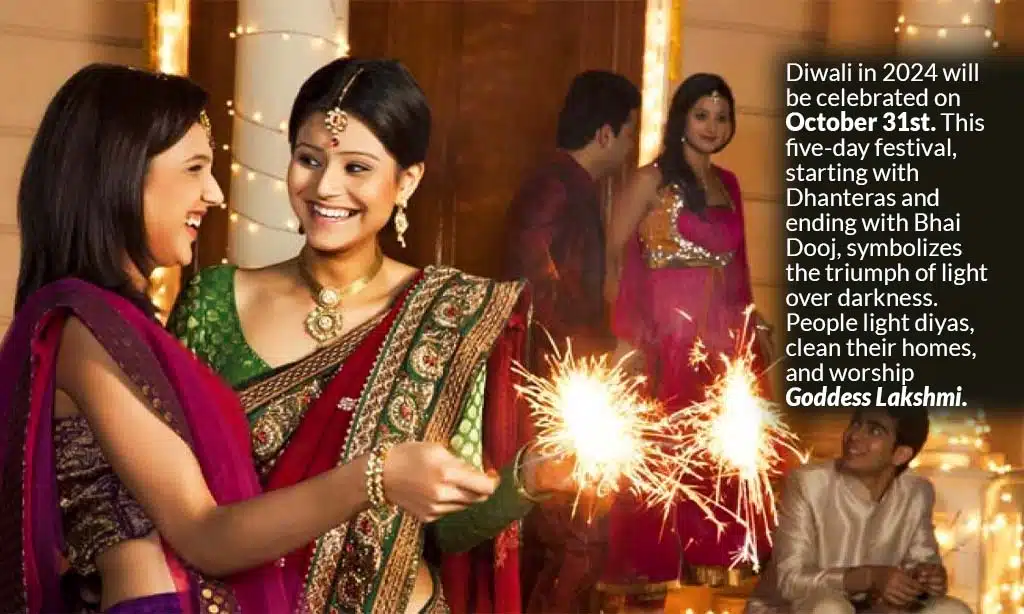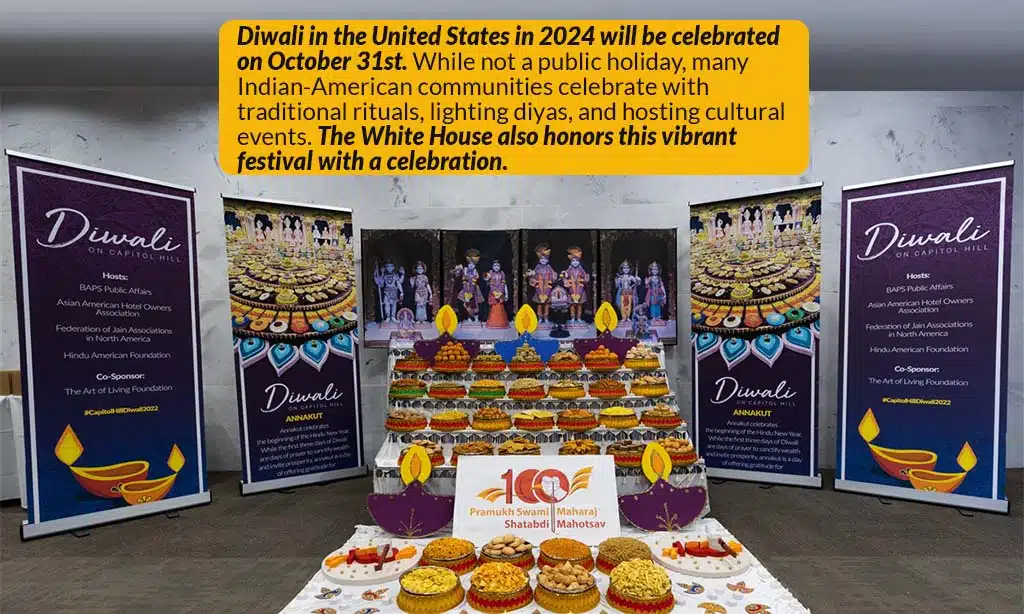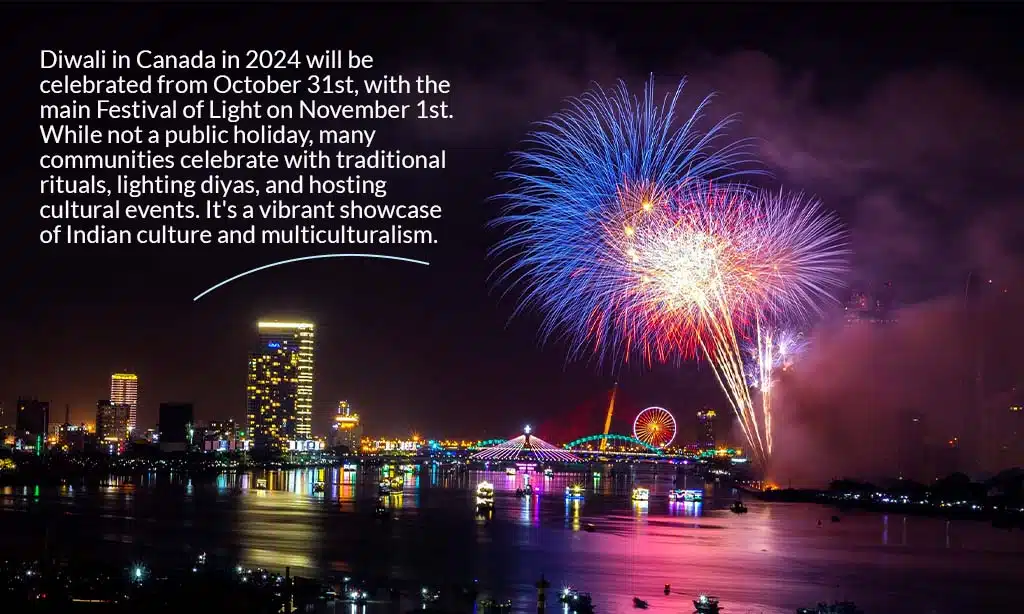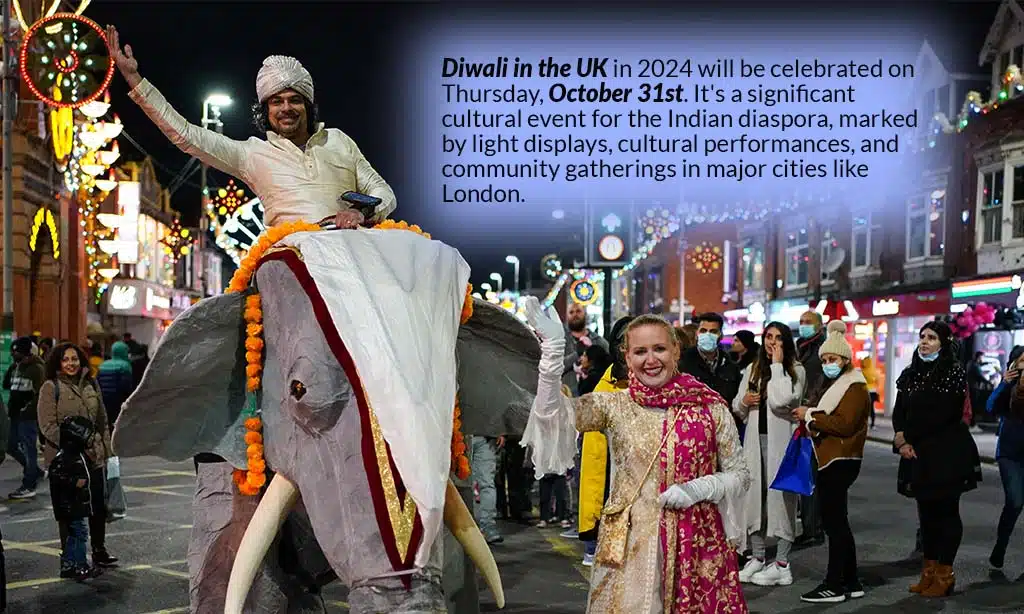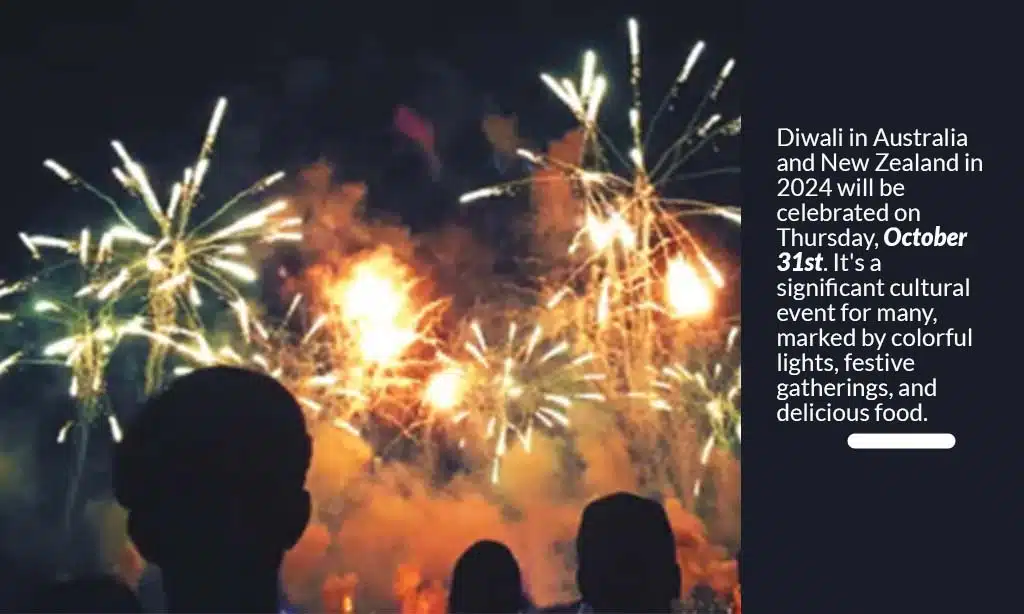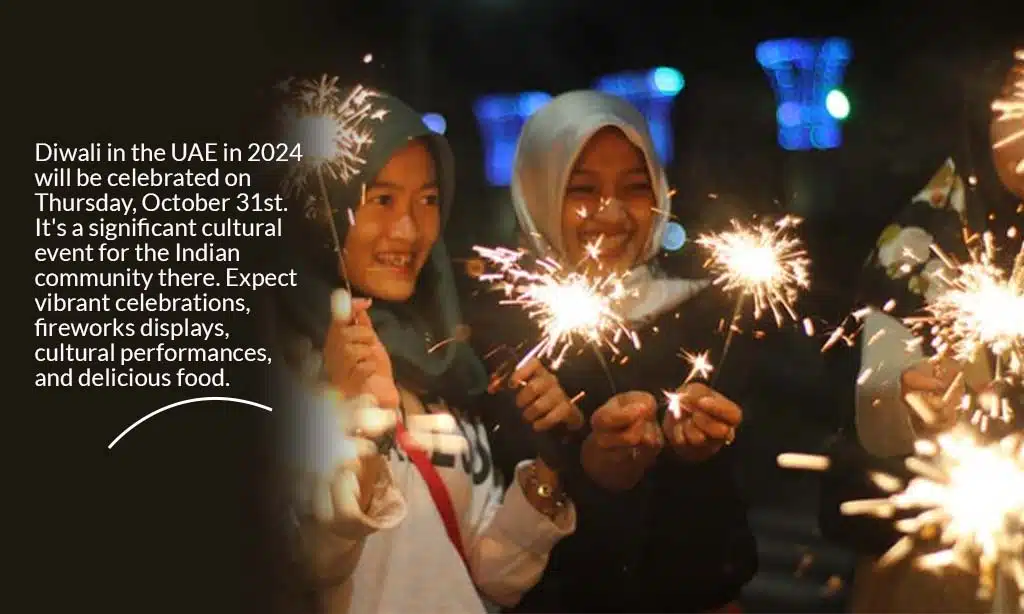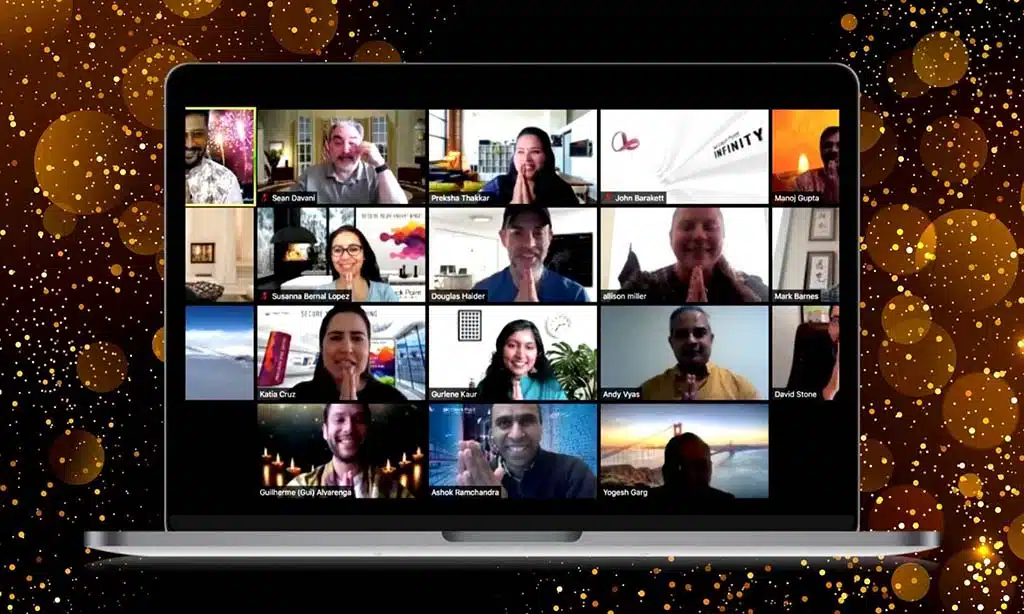One of the most well-known festivals in Indian culture is Diwali, also referred to as the “Festival of Lights,” which emphasizes themes of light triumphing over darkness, prosperity, and the triumph of good over evil. Diwali 2024 will be held on Thursday, October 31, 2024, 4:22 PM to Friday, November 1, 2024, 6:46 PM. Diwali, which has its origins in Hindu mythology, has become a beloved holiday for millions of people who practice different religions like Sikhism, Jainism, and Buddhism.
Each year, the festival brings families and communities together in vibrant celebrations featuring lights, decorations, festive foods, and cultural rituals.
While Diwali originated in India, its influence has extended far beyond, capturing the hearts of people worldwide. From the bustling streets of New Delhi to the vibrant communities in New York, Dubai, Singapore, and London, Diwali has become a truly global celebration.
In 2024, as communities from different countries prepare to celebrate Diwali, each region will bring its own unique customs and flair to the festival, adding to its richness and diversity. This article explores how Diwali is celebrated around the world, highlighting the customs, gatherings, and community spirit that make each region’s Diwali celebrations distinct.
Join us on a journey of Diwali celebration around the world and see how this festival of light illuminates lives far and wide.
Diwali Celebration Around the World
In 2024, Diwali celebrations are expected to continue growing in scale and inclusivity. International events, from Diwali fairs in the U.S. to street parades in the U.K., provide a space for cultural exchange, allowing people from all backgrounds to experience the beauty of this festival.
As Indian populations grew in countries such as the United States, Canada, the United Kingdom, and the United Arab Emirates, Diwali celebrations became more prominent, drawing interest from locals as well.
Diwali in India: The Heart of the Celebration
In India, Diwali is more than just a festival; it’s a nationwide celebration that varies significantly across regions, each adding its own unique touch. In North India, the festival commemorates Lord Rama’s return to Ayodhya after his victory over Ravana, symbolized by the lighting of lamps throughout the city.
The North is famous for elaborate fireworks displays and bustling markets filled with sweets, decorations, and vibrant clothing. In 2024, Delhi and Mumbai are set to host large-scale community events with live music, dance performances, and Diwali fairs, providing an exciting opportunity for locals and tourists to immerse themselves in the festival.
In South India, Diwali—known as Deepavali—honors Lord Krishna’s victory over the demon Narakasura. An early morning oil bath is a common start to celebrations, then family get-togethers and temple visits follow. Cities like Chennai and Bangalore will once again light up with smaller, yet equally meaningful, local events, highlighting the region’s specific customs and festive foods.
Meanwhile, the East celebrates Diwali with Kali Puja, focusing on goddess worship, particularly in Kolkata, where temple events draw massive crowds. Across India, Diwali is not just a holiday; it’s a time of profound spiritual significance and community bonding.
Diwali in the United States
The Indian diaspora in the United States widely celebrates Diwali, especially in populated areas like New York, San Francisco, and Houston. Major cities often host Diwali Mela events, where community members gather for a day of shopping, cultural performances, and delicious food.
In New York, Diwali on the Hudson has become an iconic celebration, featuring a blend of traditional Indian music, dance performances, and fireworks displays against the city skyline. Temples across the country also host Diwali celebrations, allowing families to come together for prayers, feasts, and cultural performances.
As Diwali gains recognition, more American schools and workplaces are joining in by acknowledging the festival with multicultural activities and decor. In 2024, the Diwali celebrations in the U.S. are expected to grow even more inclusive, with a variety of fusion food stalls, community charity drives, and inclusive activities in popular areas like Silicon Valley and Chicago. The festival continues to bridge cultures, bringing together people from diverse backgrounds to celebrate this joyous occasion.
Diwali in Canada
Canada is home to a significant Indian population, and Diwali celebrations have become a major part of the cultural calendar in cities like Toronto and Vancouver. In Toronto, large Diwali fairs and concerts attract thousands, with popular venues like Nathan Phillips Square hosting celebrations that include dance performances, musical acts, and festive food.
Vancouver also comes alive with Diwali events, where community groups and temples host public celebrations that include free meals, cultural activities, and craft workshops for families.
With Canada’s dedication to promoting cultural diversity, Diwali is not only celebrated by the Indian community but also widely embraced by Canadians from all backgrounds. In 2024, Diwali festivities in Canada will once again see events that emphasize cultural exchange, such as Diwali at the Distillery District in Toronto, where traditional Indian decor and art exhibitions attract attendees from across the region.
Diwali in the United Kingdom
In the United Kingdom, Diwali has become a widely celebrated festival, particularly in cities with large Indian communities like London, Leicester, and Birmingham. The city of Leicester is known for hosting one of the largest Diwali celebrations outside of India. Each year, thousands gather to witness the Diwali lights switch on, transforming the city into a dazzling spectacle of color and lights.
For Diwali 2024, Leicester is set to continue its tradition with a month-long celebration featuring markets, dance performances, and fireworks.
London’s Trafalgar Square also hosts a large Diwali event, where people gather to enjoy Indian classical dance, Bollywood music, and Indian street food. In addition, Birmingham’s Diwali celebrations include community parades and traditional ceremonies in local temples.
With support from local councils and cultural organizations, Diwali in the UK has become a testament to the country’s multicultural inclusivity, offering an opportunity for people of all backgrounds to partake in the festivities.
Diwali in Singapore and Malaysia
Diwali, known as Deepavali in Singapore and Malaysia, is a significant festival due to the presence of large Indian communities in these countries. In Singapore, the Little India district transforms into a hub of Diwali festivities, with streets adorned with lights, colorful rangoli designs, and shops selling traditional goods.
The entire area is decorated to reflect the vibrancy of the festival, drawing locals and tourists alike. For Diwali 2024, Singapore’s Deepavali Light-Up ceremony is expected to showcase an elaborate display of lights, attracting thousands to the heart of Little India.
In Malaysia, Deepavali is a public holiday, and the Indian community celebrates with temple visits, family gatherings, and festive feasts. Kuala Lumpur and Penang host grand Diwali events, where cultural performances and charity initiatives add a unique dimension to the celebrations.
Malaysian temples organize food distribution drives and cultural performances that highlight the region’s rich Indian heritage, making Diwali a key event in the country’s cultural landscape.
Diwali in Australia and New Zealand
Australia and New Zealand celebrate Diwali with enthusiasm, as the festival has become an integral part of the multicultural landscape in cities like Sydney, Melbourne, and Auckland. In Sydney, the annual Diwali Fair at Parramatta Park brings together thousands of attendees to enjoy a day filled with cultural performances, Indian cuisine, and colorful fireworks.
Melbourne also hosts Diwali events at Federation Square, which include live performances, traditional dances, and vibrant decor.
In New Zealand, Auckland’s Diwali Festival has grown to become one of the largest Indian cultural events, attracting both locals and visitors. This festival highlights traditional Indian art, food stalls, and dance performances, providing a glimpse into the culture of India.
In 2024, the Diwali celebrations in Australia and New Zealand are expected to be even larger, with multicultural initiatives that promote cross-cultural exchange, making Diwali a festival enjoyed by all.
Diwali in the United Arab Emirates
In the United Arab Emirates, where a large Indian expatriate population resides, Diwali has become a widely celebrated festival. Dubai and Abu Dhabi, in particular, host grand Diwali events that include fireworks, shopping festivals, and public performances.
Dubai’s iconic landmarks, such as the Burj Khalifa and Global Village, often display festive lights and special Diwali shows, drawing large crowds.
In addition, shopping malls across the UAE offer Diwali-themed sales, decor, and entertainment, making the festival a key event for businesses and families alike.
For Diwali 2024, Dubai is expected to host even more community-driven events, such as cultural showcases and interactive workshops, allowing people from various cultural backgrounds to experience the festival’s rich traditions.
Unique Diwali Customs Around the World
Indian communities abroad, alongside local populations, bring Diwali to life with cultural parades, elaborate light displays, and even public holiday observances. This worldwide enthusiasm highlights the power of Diwali to transcend borders, uniting people in a celebration of light, positivity, and community.
Schools and workplaces in multicultural hubs like London, Toronto, and San Francisco often acknowledge Diwali with celebratory events, giving non-Indians the opportunity to learn about and participate in the festivities.
The role of digital media has also been essential in expanding Diwali’s reach. Social media platforms like Instagram and Facebook showcase Diwali’s beautiful visuals and meaningful rituals, inspiring people worldwide to join in the festivities. Each year, Diwali-related hashtags trend globally, highlighting traditional clothing, decor, and unique regional celebrations.
Furthermore, Bollywood, India’s iconic film industry, has helped spread Indian culture, making Diwali themes, music, and customs widely recognizable beyond India’s borders.
Fusion of Cultures and Traditions
Diwali, celebrated across many countries, often reflects a fascinating blend of Indian customs with local cultural elements, resulting in unique traditions that vary widely from region to region. In the United States, for example, Diwali celebrations incorporate American customs like themed parties and community potlucks.
In addition to traditional Indian cuisine, these gatherings often feature fusion dishes, such as spiced pumpkin samosas or cranberry-infused sweets, blending seasonal American ingredients with traditional flavors.
In Canada, where Diwali falls close to the Canadian Thanksgiving holiday, families sometimes host joint celebrations that feature both Thanksgiving and Diwali elements. It’s not uncommon for Canadian Diwali dinners to include fusion dishes like butter chicken alongside Thanksgiving favorites, creating a unique culinary experience that celebrates both cultures.
In Singapore, where the Indian, Malay, and Chinese communities all celebrate Diwali, you can frequently see Malay traditional clothing and Chinese-style lanterns alongside the festival’s vibrant rangoli and oil lamps. Local festivals showcase cultural performances from different ethnic groups, demonstrating the harmony and multicultural identity of Singapore.
Likewise, in Malaysia, Diwali events held in multicultural neighborhoods sometimes feature traditional Malay and Chinese performances, as well as Indian classical music and dance, embodying the spirit of unity and cultural fusion.
Virtual Diwali Celebrations in 2024
With the global nature of Diwali celebrations, virtual Diwali events have become increasingly popular as a way to connect with loved ones around the world. This trend took off during the COVID-19 pandemic and continues to bring people together in innovative ways.
Many Indian communities across North America, Europe, and even the Middle East organize virtual Diwali events where families and friends from different time zones can participate in online aarti (prayer rituals), virtual rangoli competitions, or Diwali cooking classes.
For 2024, virtual Diwali celebrations are expected to become even more interactive. Organizations like the Indian Cultural Association in the United States and the Indian Business Network in the U.K. are planning virtual celebrations, including live-streamed concerts, interactive games, and virtual Diwali fairs where participants can shop for Diwali items online. This allows people who are unable to travel to feel part of the celebration and keep traditions alive, no matter where they are.
Virtual gatherings have also expanded to include social media challenges, where participants share their Diwali décor, fashion, or rangoli designs. Some communities even host virtual Diwali light displays, allowing families to showcase their homes adorned with diyas and festive lights.
Additionally, businesses across the globe have joined in, hosting virtual Diwali cooking classes, DIY décor workshops, and even yoga sessions themed around Diwali, providing a wide array of options for people to celebrate from the comfort of their homes.
Takeaways
Diwali is more than just a festival; it’s a vibrant celebration of light, community, and cultural heritage that has grown from its ancient origins in India to become a beloved global event. Across continents, from the bustling cities of North America to the serene temples in Southeast Asia, Diwali unites people with its universal themes of hope, prosperity, and the triumph of light over darkness.
In 2024, Diwali has evolved to be much more than an Indian festival; it has become a symbol of multicultural unity, embracing local customs alongside traditional rituals. The festival’s influence continues to expand thanks to digital media, community-driven events, and increased recognition in countries around the world.
Diwali’s global reach shows how cultural traditions can connect communities, fostering cross-cultural understanding and spreading positivity.
Looking ahead, Diwali’s future as a worldwide celebration seems brighter than ever. It’s a festival that invites everyone to experience its beauty and joy, transcending borders and building bridges between cultures.


